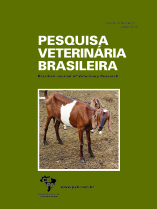 |
|
|
|
Year 2018 - Volume 38, Number 6
|

|
Spontaneous abortion, congenital malformation and reproductive losses in goats due to poisoning by the leaves of Poincianella pyramidalis (syn. Caesalpinia pyramidalis), 38(6):1051-1057
|
ABSTRACT.- Souza M.F., Bezerra I.T.F., Barbosa F.M.S., Rocha V.C., Sousa M.S., Oliveira Neto T.S., Lacerda-Lucena P.B. & Lucena R.B. 2018. [Spontaneous abortion, congenital malformation and reproductive losses in goats due to poisoning by the leaves of Poincianella pyramidalis (syn. Caesalpinia pyramidalis).] Abortos, malformações congênitas e falhas reprodutivas espontâneas em caprinos causados pela intoxicação pelas folhas da catingueira, Poincianella pyramidalis (sin. Caesalpinia pyramidalis). Pesquisa Veterinária Brasileira 38(6):1051-1057. Laboratório de Patologia Veterinária, Departamento de Ciências Veterinárias, Centro de Ciências Agrárias, Universidade Federal da Paraíba, Campus II, Areia, PB 58397-000, Brazil. E-mail: lucena.rb@gmail.com
The aim of this study was to investigate the effects of the leaves of the tree Poincianella pyramidalis (Tul.) L.P. Queiroz as a spontaneous cause of abortion, malformation and reproductive failure in goat herds in the Brazilian semiarid region. Epidemiological investigations, clinical evaluation of goats affected by malformation and necropsy of aborted fetuses was carried out on 12 farms located in the municipalities of Gurjão and Soledade, state of Paraíba, and on a farm located at the municipality of Pau dos Ferros, state of Rio Grande do Norte. The study considered only the farms where occurred predominantly P. pyramidalis among teratogenic plants. On the farm located in the municipality of Pau dos Ferros the occurrence of frequent abortion and birth of malformed goats, affecting 90% of pregnant goats, was observed. On the 12 farms belonging to the municipalities of Gurjão and Soledade, spontaneous cases of embryonic mortality, abortion and malformation occurred in 257 goats (41.1% of goats). Arthrogryposis was the main congenital malformation observed. Necropsy and histopathological exams of four fetuses and their placentas did not detect the presence of infectious agents. The cases of embryonic mortality, abortion and malformation were predominantly concentrated during the seasons of the year when pasture was scarce, but P. pyramidalis was available, due to the occurrence of pre-seasonal rains, which did not allow the pasture to germinate but P. pyramidalis to regrowth. The findings of this study confirm that this plant significantly interferes in the reproductive efficiency of semi-arid goat herds. |
| |
|
|
| |
|
 |